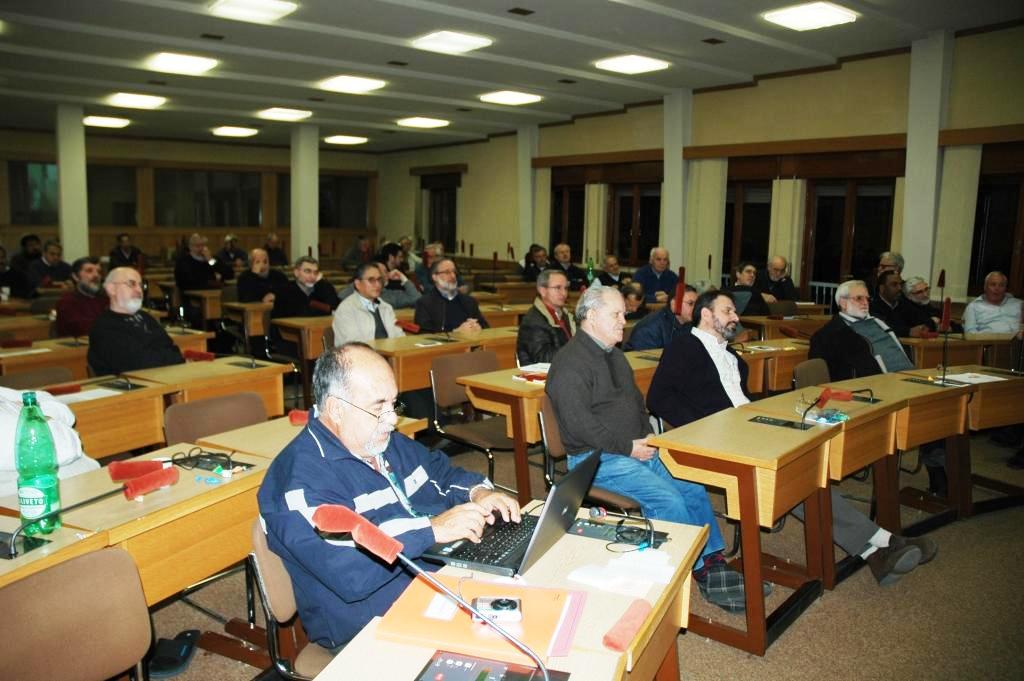Daniel Comboni
Comboni Missionaries
Institutional area
Other links
Newsletter
Rome: Monday 7th March 2011
The second week of the Meeting between the General Administration of the Comboni Missionaries and the Provincial and Delegation Superiors ended on March 6th 2011 with a pilgrimage to Assisi, the land of Francis, a saint who profoundly challenged the society and Church of his day.
The message of Francis of Assisi, a life characterised by simplicity and peace, by the love of one’s neighbour and by a deep respect for nature, remains relevant even today. The Superiors will continue their series of Meetings in Rome until March 12th 2011. Recent events in North Africa and the Nile Region were vividly remembered and re-lived by the Comboni Missionaries present in Rome (see accompanying photograph). Eye-witness accounts were provided by Fathers Paul Annis (Egypt), Angelo Giorgetti (Khartoum/North Sudan) and Daniele Moschetti (South Sudan). Through words and images the Fathers expressed the sufferings, the joys and the hopes of their peoples who are celebrating their newly-won freedom.
For the Egyptian, Father Paul Annis, “the most surprising aspect of the struggle was the power, the speed and the efficacy of SMS texting through mobile telephony, which fuelled the unrest and allowed protesters to mobile the masses in a matter of days, leading to the fall of the dictator Mohamed Hosni Mubarak, President of the Arab Republic of Egypt since October 1981”.
“The Comboni Missionaries present in Egypt”, continued Father Paul, “partook in the rejoicing of their people, even if, at the beginning of the protests they had only followed events on television and through the windows of our Community overlooking Tahir Square, in the centre of Cairo”.
Fr. Daniele Moschetti, in turn, recounted the historic moment on January 9th last, which concluded fifty-five years of suffering, oppression and death in the Region of Southern Sudan. The referendum had given birth to a new African nation, free and independent: the Republic of South Sudan. “With a turn-out of 98.83 per cent”, said the Missionary, “some 96 per cent of the population of the South had voted to secede from the North and fulfil the prophecy of the Sudanese Bishops who had anticipated the turn of events with the slogan: ‘Sudan will never be the same again!’.
According to Father Daniele, “the Comboni Missionaries present in Southern Sudan shared the profound joy of their people, in the hope of a future characterised by peace”. “For this reason, the new President Salva Kiir, a Dinka and practicing Catholic, must form a government drawn from all the differing ethnic and political groupings in the country”, continued the Missionary, “for there are many challenges for the State and the Church, and in particular those regarding the delineation of the new borders; the rightful exploitation of the country’s oil reserves and the equitable distribution of the riches thereby accrued; negotiations regarding the Region of Abyei, where there have been very violent conflicts of late; the division of the foreign debt; citizenship; and reconsidering the whole pastoral strategy of the Church in one of the poorest countries of the world”.
“The Comboni Missionaries and the peoples of Northern Sudan have, to varying degrees, thought along the following lines: a divided Sudan is a weakened Sudan”, claimed Fr. Angelo Giorgetti,
“The present situation is one of tension and wholesale dissatisfaction. The results of the recent referendum have led to fears of a resurgence in persecution against the peoples of the South and Christians who actually reside in the North. Moreover, there are grounds for believing that the discontent of the Northerners with the government in Khartoum may well lead to the fall of the Sudanese President, Omar Hassan Ahmad al-Bashir, who seized power in a coup d’etat in June 1989.
A further important moment in the Meeting between the Provincial and Delegations Superiors
and the General Administration was the contribution of Dr. Fiorella Capasso, an expert in Psycho-Sociology. As a noted expert in her field, and after an evaluation of our Institute’s recent official documents in the light of post-modern thought and society, Dr. Capasso presented her view of the Comboni Missionaries of the Heart of Jesus. Dr. Capasso was of the considered opinion that “the Comboni Missionaries must allow themselves be challenged by the ‘language’ of our post-modern times and strive to be more open to new ways of thinking and being present in the world, in order to undertake the changes to which the recent documents of their Institute make reference”. Among other things, the consultant commented that it was not simply a case of feeling the necessity and urgency of transforming the life and Mission of the Institute, but it was essential to activate the mechanisms to realize such transformation.
The General Secretaries of the Institute presented the Provincial and Delegation Superiors with a series of detailed reports on the work they are currently undertaking and that foreseen for the coming three years. Such moments were considered privileged in the process of defining ever more clearly the type of communication that must exist between the General Administration, the General Secretaries and the Superiors of Provinces and Delegations.




